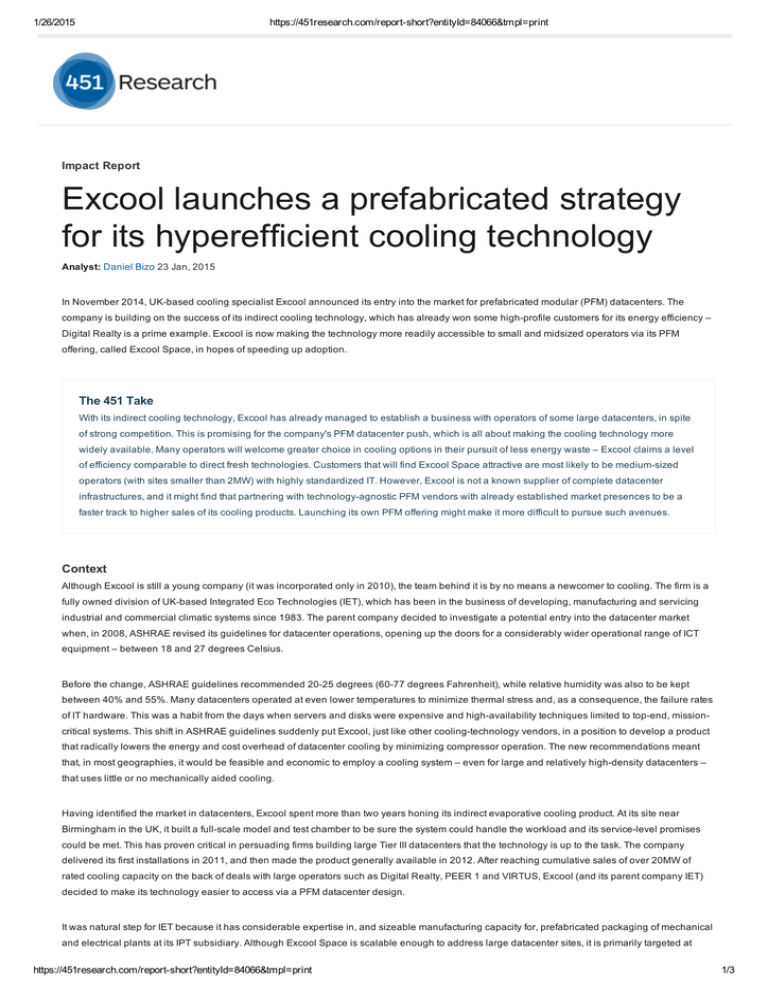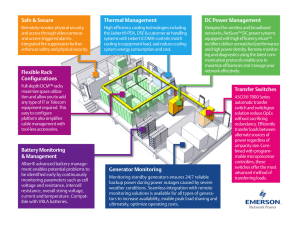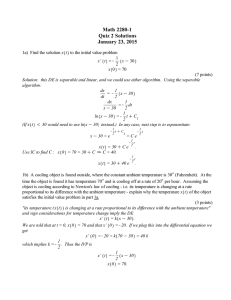
1/26/2015
https://451research.com/report­short?entityId=84066&tmpl=print
Impact Report
Excool launches a prefabricated strategy
for its hyperefficient cooling technology
Analyst: Daniel Bizo 23 Jan, 2015
In November 2014, UK­based cooling specialist Excool announced its entry into the market for prefabricated modular (PFM) datacenters. The
company is building on the success of its indirect cooling technology, which has already won some high­profile customers for its energy efficiency –
Digital Realty is a prime example. Excool is now making the technology more readily accessible to small and midsized operators via its PFM
offering, called Excool Space, in hopes of speeding up adoption.
The 451 Take
With its indirect cooling technology, Excool has already managed to establish a business with operators of some large datacenters, in spite
of strong competition. This is promising for the company's PFM datacenter push, which is all about making the cooling technology more
widely available. Many operators will welcome greater choice in cooling options in their pursuit of less energy waste – Excool claims a level
of efficiency comparable to direct fresh technologies. Customers that will find Excool Space attractive are most likely to be medium­sized
operators (with sites smaller than 2MW) with highly standardized IT. However, Excool is not a known supplier of complete datacenter
infrastructures, and it might find that partnering with technology­agnostic PFM vendors with already established market presences to be a
faster track to higher sales of its cooling products. Launching its own PFM offering might make it more difficult to pursue such avenues.
Context
Although Excool is still a young company (it was incorporated only in 2010), the team behind it is by no means a newcomer to cooling. The firm is a
fully owned division of UK­based Integrated Eco Technologies (IET), which has been in the business of developing, manufacturing and servicing
industrial and commercial climatic systems since 1983. The parent company decided to investigate a potential entry into the datacenter market
when, in 2008, ASHRAE revised its guidelines for datacenter operations, opening up the doors for a considerably wider operational range of ICT
equipment – between 18 and 27 degrees Celsius.
Before the change, ASHRAE guidelines recommended 20­25 degrees (60­77 degrees Fahrenheit), while relative humidity was also to be kept
between 40% and 55%. Many datacenters operated at even lower temperatures to minimize thermal stress and, as a consequence, the failure rates
of IT hardware. This was a habit from the days when servers and disks were expensive and high­availability techniques limited to top­end, mission­
critical systems. This shift in ASHRAE guidelines suddenly put Excool, just like other cooling­technology vendors, in a position to develop a product
that radically lowers the energy and cost overhead of datacenter cooling by minimizing compressor operation. The new recommendations meant
that, in most geographies, it would be feasible and economic to employ a cooling system – even for large and relatively high­density datacenters –
that uses little or no mechanically aided cooling.
Having identified the market in datacenters, Excool spent more than two years honing its indirect evaporative cooling product. At its site near
Birmingham in the UK, it built a full­scale model and test chamber to be sure the system could handle the workload and its service­level promises
could be met. This has proven critical in persuading firms building large Tier III datacenters that the technology is up to the task. The company
delivered its first installations in 2011, and then made the product generally available in 2012. After reaching cumulative sales of over 20MW of
rated cooling capacity on the back of deals with large operators such as Digital Realty, PEER 1 and VIRTUS, Excool (and its parent company IET)
decided to make its technology easier to access via a PFM datacenter design.
It was natural step for IET because it has considerable expertise in, and sizeable manufacturing capacity for, prefabricated packaging of mechanical
and electrical plants at its IPT subsidiary. Although Excool Space is scalable enough to address large datacenter sites, it is primarily targeted at
https://451research.com/report­short?entityId=84066&tmpl=print
1/3
1/26/2015
https://451research.com/report­short?entityId=84066&tmpl=print
small and medium­sized facilities where either the project size cannot absorb lengthy and expensive design cycles, or requirements are rather
standard. Excool and IET have their engineering and manufacturing in the UK, which makes the British Isles and Western Europe the foremost
target for Excool Space. The company is in the process of establishing itself in Germany. Expansion into North America is also likely in the next 12
months, 451 Research believes.
Excool counts on partners that offer design­and­build services to take Excool Space and create complete datacenter infrastructures. It is therefore
not a full provider of PFM datacenters, but a provider of a core into which other components (such as power) must be added. If the operator prefers
to have a fully PFM facility, the electric room can be built out as part of Excool Space and then fit­out with power systems. This approach lets Excool
focus on what it does best, while also allowing room for design and build partners to differentiate and add value – identifying the right partners will
be critical to its success.
Technology
The name Excool Space is telling: it integrates the company's indirect cooling units with a data hall. As such, it is not a complete datacenter
infrastructure because critical power equipment is not part of the base package. Excool's indirect cooling technology, core to Excool Space's
proposition, can achieve a partial PUE of around 1.07 or better (meaning that facility cooling is about 7% of the IT load on average), according to
data from the company. In fact, the firm claims that at key European and North American datacenter markets, such as London, Paris, Frankfurt,
Amsterdam and New York, the overhead is lower than 5% when using ASHRAE­recommended set points, assuming that average utilization is in the
60­80% range. Efficiency will slightly degrade at low utilization levels (as well as very high loads), but the company claims a near flat PUE curve
across the load range above 20%.
Because outside air never mixes with the air in the data hall, and the adiabatic and evaporative cooling technique is effective in all but the most
extreme climatic conditions, the optional DX unit is typically sized only to assist the operation, rather than acting as a full backup. This saves capital
cost across the whole upstream power infrastructure too, or allows operators to drive higher IT loads from the same power envelope. The
background of the cooling technology is discussed in more detail in our previous report.
Excool Space has the cooling units mounted on the side (at one end to be precise) of the data hall (some existing customers for the cooling product
have rooftop installations). This should reduce the loading on the structure, which makes it lower cost, and also lends itself to derivative multi­story
designs in the future. Cooling units share an air plenum and operate in concert for the data hall. The white space has raised floor and employs hot­
aisle containment to regulate airflow. Uncontained racks (for freestanding and not front­back cooled systems) can also be accommodated in limited
numbers without substantial loss of cooling efficiency. The electric room can be added at the far end of the data hall if required.
Currently, available reference designs start from 300kW and scale up to 2MW in a single integrated facility in increments of about 200kW. Average
rack densities can range from as low as 2.5kW to over 15kW, which will determine the number and capacity of the cooling units supporting a single
data hall. The size of the hall (and total power/cooling capacity) can be scaled by replicating the building blocks. Neither the total cooling capacity
nor the thermal density needs to be locked in at the design stage. Further cooling units can be added later to the facility if planned for (there are free
mounting positions) to cover for the growth of IT load – be it the addition of extra racks in an existing space, racks getting more powerful, or unused
space getting populated.
The company claims that, by using its indirect cooling technology, Excool Space can achieve annualized PUE of 1.2 or better in most locations,
including hot desert and humid subtropical climates – assuming the operator applies the latest ASHRAE recommendations for datacenters. If the
'allowable' envelope is used, compressor operation is virtually eliminated in all but very hot and humid (tropical) weather conditions.
Competition
The market for PFM datacenters is expanding, and already includes numerous vendors with various backgrounds. Europe is particularly rich in
suppliers vying to establish themselves as leaders. BladeRoom, a UK­based PFM datacenter startup, already has some traction in the market, and
is probably the closest comparison in its strategy: bringing a highly efficient cooling technology to market using prefabrication. BladeRoom
developed a direct fresh­air­cooled (aided by evaporative cooling and fully backed up by direct expansion coils) datacenter design that is
essentially a facility­scale pressurized containment system. BladeRoom technology is highly efficient in temperate and cool climates, with
mechanical overhead as low as 5% of the IT load, and a proven record of total annual site PUE of 1.2 or below in such locations.
Cannon Technologies, another UK­based vendor, has a versatile and fine­grained PFM architecture to accommodate virtually any use case, from
freestanding legacy equipment to high­density containment systems that are strictly laid out. When its narrow­profile, in­row chilled water cooling
units are used, Cannon can add cooling capacity online to the operation, to cover for expansion or to handle higher­power racks. When paired with
efficient chillers with air­side economization mode, this strategy helps operators achieve high levels of energy efficiency through the whole lifecycle
of the facility.
https://451research.com/report­short?entityId=84066&tmpl=print
2/3
1/26/2015
https://451research.com/report­short?entityId=84066&tmpl=print
Schneider Electric, the Paris­based energy management giant and datacenter equipment vendor, is also pushing hard to advance its PFM
datacenter business. It acquired AST Modular in late 2013, and completed that integration during 2014 to gain valuable insights through the eyes of
a pioneer that had already operated in the market with its containerized and multi­module datacenters for more than a decade. Schneider appears
keen to find the fast track into selling its cooling and power equipment as part of PFM datacenter projects to find pockets of growth where its
traditional datacenter UPS and cooling­systems businesses are flat at best. Its EcoBreeze family of modular indirect evaporative cooling units is
similar in its concept and design objectives to Excool's.
Emerson Network Power is another datacenter equipment heavyweight that Excool will likely face regularly, since it is seeking growth with PFM
datacenter projects in all geographies and verticals, and of all sizes. It has an appetite for full­custom projects or even supplying PFM components
under OEM engagements with third­party vendors.
SWOT Analysis
Strengths
Weaknesses
Excool has an energy­efficient cooling system that is proven in high­
Excool is still a small company with limited resources and sales
availability datacenters. Indirect heat exchange, as opposed to
bandwidth compared with some of the big vendors. Excool Space
direct fresh products, appeals to conservative operators. Excool
introduces some layout rules that some operators may not find
Space makes it more readily accessible by leveraging IET's
flexible enough for their mixed needs.
engineering and manufacturing resources.
Opportunities
There is increasing focus on the energy efficiency and cost profile of
datacenters. Consensus is growing that elevated temperatures in
data halls are acceptable because it has marginal impact on
hardware failure rates, and that compressor­free operation is
desirable in most locations.
Threats
The culture of full customization is still ripe in the datacenter
industry, which might prevent Excool Space from making it to the
short lists of many. The PFM market is highly contested by dozens
of vendors, many of which have considerable marketing clout, while
actual sales of PFM datacenters are still sporadic. By competing
against them with Excool Space, it might be politically harder to
strike partnerships with third­party PFM vendors for its core cooling
products.
This report falls under the following categories. Click on a link below to find similar documents.
Company: Excool Other Companies: AST Modular , BladeRoom Group, Cannon Technologies, Digital Realty Trust, Emerson Electric, Emerson Network Power , The Institution of
Engineering and Technology, PEER 1 Hosting, Schneider Electric, VIRTUS Data Centres
Analyst(s): Daniel Bizo Sector(s):
Datacenter technology
Copyright © 2000­2015 The 451 Group. All Rights Reserved.
https://451research.com/report­short?entityId=84066&tmpl=print
3/3




